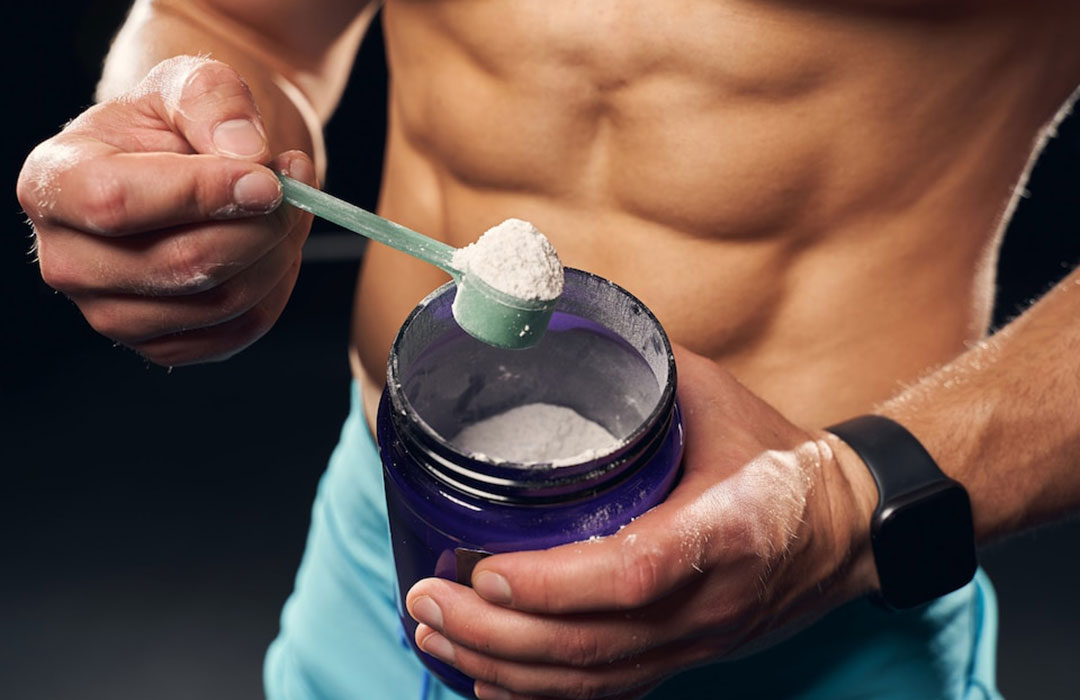Introduction
Do you know that taking creatine without working out can benefit you? While creatine is commonly associated with exercise and athletic performance, it turns out that this supplement can offer advantages even on rest days. This article will explore the fascinating world of creatine supplementation and the five key benefits of engaging in this practice without hitting the gym. So, let’s dive in and discover how taking creatine without working out can positively impact your overall well-being.
Taking Creatine without Working Out: Unveiling the Surprising Benefits
1. Boosts Energy Levels
One of the significant benefits of taking creatine without working out is its energy level boost. Creatine is a natural compound crucial in producing adenosine triphosphate (ATP), the primary energy source for cellular function. Increasing the creatine levels in your body can ensure a steady supply of ATP, leading to enhanced energy levels throughout the day.
2. Enhances Muscle Recovery
Although not immediately apparent, taking creatine without working out can aid muscle recovery. Creatine has been shown to promote the regeneration of adenosine triphosphate (ATP) and increase the availability of phosphocreatine, an essential energy source for muscle cells. By replenishing these energy stores, creatine accelerates recovery, allowing muscles to bounce back faster from intense exercise sessions.
3. Improves Brain Function
Beyond its physical benefits, taking creatine without working out can positively impact your cognitive abilities. Creatine is known to support brain health and function by providing a readily available energy source for brain cells. Studies have suggested that creatine supplementation may enhance memory, attention span, and overall cognitive performance, making it a valuable tool for individuals seeking to optimize their mental capabilities.
4. Supports Hydration and Water Balance
One common concern when taking creatine without working out is the potential for dehydration. However, it is essential to note that creatine does not dehydrate the body. Creatine supplementation can support hydration and water balance. Creatine molecules draw water into muscle cells, increasing their volume and promoting better hydration. To maximize the benefits and minimize potential risks, staying adequately hydrated while taking creatine is essential, regardless of whether you exercise.
5. Promotes Muscle Fullness and Size
Another intriguing benefit of taking creatine without working out is its potential to promote muscle fullness and size. Creatine supplementation increases the water content within muscle cells, leading to a volumizing effect that can enhance the appearance of muscle mass. At the same time, this effect may not be as pronounced as when combined with exercise; taking creatine without hitting the gym can still contribute to a more defined and sculpted physique.
Taking Creatine on Rest Days: Maximizing the Benefits
Now that we have explored the five benefits of taking creatine without working out, you may wonder how to incorporate this practice into your routine. Here are some guidelines to help you make the most of your creatine supplementation on rest days:
- Timing: Take creatine daily, even on rest days, to maintain consistent levels in your body. Consider splitting the recommended daily dose into multiple smaller servings daily for better absorption.
- Dosage: Follow the recommended dosage guidelines from your healthcare professional or the product manufacturer. Not exceeding the recommended daily creatine intake is essential to ensure safety and minimize potential side effects.
- Hydration: Drink plenty of water while taking creatine, whether you’re working out or not. Adequate hydration is crucial to support the absorption and utilization of creatine in your body.
- Nutrition: Maintain a balanced and nutritious diet to provide your body with the nutrients for optimal creatine utilization. To support muscle growth and recovery, incorporate high-quality protein sources, such as lean meats, fish, eggs, and dairy products.
- Consultation: If you have any pre-existing medical conditions or concerns, it is advisable to consult with a healthcare professional before starting any new supplementation regimen.
By following these guidelines, you can maximize the benefits of taking creatine without working out and support your overall health and fitness goals.
What is the relationship between creatine and brain health?
Creatine is not only known for its benefits in improving physical performance but also for its potential positive effects on brain health. The brain requires significant energy to function optimally, and creatine is crucial in providing this energy. It is a readily available source of ATP (adenosine triphosphate), the primary energy currency in our cells, essential for various brain functions.
Research suggests that creatine supplementation may enhance cognitive function, memory, and overall brain performance. It can also be particularly beneficial for individuals with high mental demands, such as executives or people working in fast-paced environments. By increasing the brain’s energy supply, creatine may improve focus, mental clarity, and decision-making abilities.
How might a creatine supplement benefit executives or people in fast-paced working environments?
For executives and individuals in fast-paced working environments, the job demands can be mentally taxing, leading to increased stress and fatigue. Creatine supplementation may offer several advantages in such scenarios:
a. Enhanced Mental Stamina: The increased availability of ATP through creatine supplementation can help sustain mental energy levels during long and demanding work hours.
b. Improved Cognitive Function: Studies suggest that creatine may enhance cognitive functions such as working memory, information processing, and mental alertness, which are crucial for executives to perform at their best.
c. Reduced Mental Fatigue: By supporting energy metabolism in the brain, creatine may help reduce mental fatigue, enabling individuals to maintain focus and productivity throughout the day.
d. Stress Reduction: Some research indicates that creatine might have a role in reducing cortisol levels, a hormone associated with stress. Lower stress levels can positively impact decision-making and overall well-being.
What does creatine do in our bodies?
Creatine is a naturally occurring compound found in small amounts in certain foods and synthesized by the body in the liver, kidneys, and pancreas. Its primary role is to serve as a quick and easily accessible energy source, especially during short bursts of intense physical activity.
When creatine enters the body, it binds with a phosphate molecule to form phosphocreatine, stored in the muscles. During activities like weightlifting, sprinting, or jumping, the stored phosphocreatine can rapidly donate its phosphate group to ADP (adenosine diphosphate) to regenerate ATP. This replenishes ATP levels, providing the energy needed for these high-intensity activities.
Does creatine provide any additional health benefits besides performance improvement?
Yes, besides its well-known performance-enhancing effects, creatine has been studied for its potential additional health benefits:
Muscle Recovery
Creatine supplementation may accelerate muscle recovery after exercise by reducing inflammation and oxidative stress, leading to faster repair and growth of muscle tissues.
Bone Health
Some research suggests that creatine may positively impact bone health by increasing bone mineral density, potentially reducing the risk of osteoporosis.
Neuroprotective Properties
As mentioned earlier, creatine’s role in brain energy metabolism may offer neuroprotective effects, providing support against neurodegenerative diseases.
Glycemic Control
Studies have shown that creatine may improve glucose tolerance and insulin sensitivity, potentially benefiting individuals with type 2 diabetes.
How much creatine does your body produce a day?
The human body naturally produces about one to two grams of creatine daily. The synthesis occurs mainly in the liver, kidneys, and pancreas, where specific amino acids (arginine, glycine, and methionine) combine to form creatine.
However, the amount of creatine produced endogenously may not meet the demands of intense physical activity or provide additional health benefits. Some individuals opt for creatine supplementation to ensure an adequate supply.
Does creatine make you bloated?
One reported side effect of creatine supplementation is water retention, which can lead to a bloated appearance in some individuals. However, it’s essential to understand that not everyone experiences bloating, even those who may find it a temporary and mild effect.
The water retention caused by creatine occurs intracellularly, primarily within the muscle cells. This effect can increase muscle size and strength, as the additional water within the muscles can create a more anabolic environment.
Staying adequately hydrated while taking creatine and following the recommended dosages is essential to minimize bloating. Additionally, some individuals may be more prone to water retention than others, so that individual responses can vary. If bloating becomes bothersome, reducing the creatine dosage or discontinuing its use can help alleviate the issue.
FAQs
-
What happens if you take creatine and don’t work out?
It is generally safe to take creatine without working out. Creatine is a naturally occurring compound found in the body and in various foods. However, it is always advisable to consult with a healthcare professional before starting any new supplementation regimen, especially if you have any pre-existing medical conditions.
-
Is taking creatine before working out good?
While taking creatine before a workout can provide an immediate energy boost, it is unnecessary if you’re not engaging in physical activity. However, taking creatine before your workout can help increase your performance and aid in muscle recovery if you plan to exercise.
-
Can you gain weight with creatine without working out?
While creatine supplementation may cause a slight increase in body weight due to water retention within the muscles, significant weight gain is unlikely without regular exercise. To avoid excessive weight gain, it is essential to maintain a balanced diet and engage in physical activity that complements your goals.
-
What happens if you take creatine without drinking water?
Proper hydration is crucial when taking creatine, as it helps ensure the absorption and utilization of this supplement. Failing to drink enough water while taking creatine may increase the risk of dehydration and potential side effects. Always remember to stay adequately hydrated by consuming water throughout the day.
-
Is it OK taking creatine everyday?
You can take creatine every day, even on rest days. Consistent daily intake of creatine helps maintain optimal levels in your body, supporting its various functions. However, following the recommended dosage guidelines is essential, and consult with a healthcare professional if you have any concerns.
-
Can I combine creatine with other supplements?
Creatine can be safely combined with other supplements, such as protein powders, branched-chain amino acids (BCAAs), and pre-workout formulas. However, consulting with a healthcare professional or a registered dietitian is recommended to ensure the appropriate use and combination of supplements based on your specific needs and goals.
Conclusion
In conclusion, taking creatine without working out can offer several benefits that extend beyond the realm of exercise and athletic performance. From boosting energy levels to supporting muscle recovery and enhancing brain function, creatine supplementation can be a valuable addition to your routine, even on rest days. Remember to follow the recommended dosage guidelines, stay adequately hydrated, and maintain a balanced diet to optimize the positive effects of creatine. By incorporating creatine into your daily routine, you can experience its remarkable benefits, improving overall well-being and performance.
Reference: National Library of Medicine




